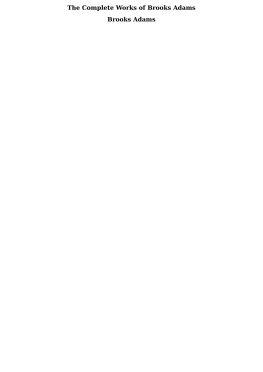CHAPTER I
I wrote this little volume more than thirty years ago, since when I have hardly opened it. Therefore I now read it almost as if it were written by another man, and I find to my relief that, on the whole, I think rather better of it than I did when I published it. Indeed, as a criticism of what were then the accepted views of Massachusetts history, as expounded by her most authoritative historians, I see nothing in it to retract or even to modify. I do, however, somewhat regret the rather acrimonious tone which I occasionally adopted when speaking of the more conservative section of the clergy. Not that I think that the Mathers, for example, and their like, did not deserve all, or, indeed, more than all I ever said or thought of them, but because I conceive that equally effective strictures might have been conveyed in urbaner language; and, as I age, I shrink from anything akin to invective, even in what amounts to controversy.
Therefore I have now nothing to alter in the Emancipation of Massachusetts, viewed as history, though I might soften its asperities somewhat, here and there; but when I come to consider it as philosophy, I am startled to observe the gap which separates the present epoch from my early middle life.
The last generation was strongly Darwinian in the sense that it accepted, almost as a tenet of religious faith, the theory that human civilization is a progressive evolution, moving on the whole steadily toward perfection, from a lower to a higher intellectual plane, and, as a necessary part of its progress, developing a higher degree of mental vigor. I need hardly observe that all belief in democracy as a final solution of social ills, all confidence in education as a means to attaining to universal justice, and all hope of approximating to the rule of moral right in the administration of law, was held to hinge on this great fundamental dogma, which, it followed, it was almost impious to deny, or even to doubt. Thus, on the first page of my book, I observe, as if it were axiomatic, that, at a given moment, toward the opening of the sixteenth century, Europe burst from her medival torpor into the splendor of the Renaissance, and further on I assume, as an equally self-evident axiom, that freedom of thought was the one great permanent advance which western civilization made by all the agony and bloodshed of the Reformation. Apart altogether from the fact that I should doubt whether, in the year 1919, any intelligent and educated man would be inclined to maintain that the twelfth and thirteenth centuries were, as contrasted with the nineteenth, ages of intellectual torpor, what startles me in these paragraphs is the self-satisfied assumption of the finality of my conclusions. I posit, as a fact not to be controverted, that our universe is an expression of an universal law, which the nineteenth century had discovered and could formulate.
During the past thirty years I have given this subject my best attention, and now I am so far from assenting to this proposition that my mind tends in the opposite direction. Each day I live I am less able to withstand the suspicion that the universe, far from being an expression of law originating in a single primary cause, is a chaos which admits of reaching no equilibrium, and with which man is doomed eternally and hopelessly to contend. For human society, to deserve the name of civilization, must be an embodiment of order, or must at least tend toward a social equilibrium. I take, as an illustration of my meaning, the development of the domestic relations of our race.
I assume it to be generally admitted, that possibly mans first and probably his greatest advance toward orderand, therefore, toward civilizationwas the creation of the family as the social nucleus. As Napoleon said, when the lawyers were drafting his Civil Code, Make the family responsible to its head, and the head to me, and I will keep order in France. And yet although our dependence on the family system has been recognized in every age and in every land, there has been no restraint on personal liberty which has been more resented, by both men and women alike, than has been this bond which, when perfect, constrains one man and one woman to live a joint life until death shall them part, for the propagation, care, and defence of their children.
The result is that no civilization has, as yet, ever succeeded, and none promises in the immediate future to succeed, in enforcing this primary obligation, and we are thus led to consider the cause, inherent in our complex nature, which makes it impossible for us to establish an equilibrium between mind and matter. A difficulty which never has been even partially overcome, which wrecked the Roman Empire and the Christian Church, which has wrecked all systems of law, and which has never been more lucidly defined than by Saint Paul, in the Epistle to the Romans, For we know that the law is spiritual: but I am carnal, sold under sin. For that which I do, I allow not: for what I would, that do I not; but what I hate, that do I.... Now then it is no more I that do it, but sin that dwelleth in me.... For the good that I would, I do not: but the evil which I would not, that I do.... For I delight in the law of God after the inward man: ... But I see another law in my members, warring against the law of my mind, and bringing me into captivity to the law of sin which is in my members. O wretched man that I am! who shall deliver me from the body of this death? [Footnote: Romans vii, 14-24.]
And so it has been since a time transcending the limits of imagination. Here in a half-a-dozen sentences Saint Paul exposes the ceaseless conflict between mind and matter, whose union, though seemingly the essence of life, creates a condition which we cannot comprehend and to which we could not hope to conform, even if we could comprehend it. In short, which indicates chaos as being the probable core of an universe from which we must evolve order, if ever we are to cope with violence, fraud, crime, war, and general brutality. Wheresoever we turn the prospect is the same. If we gaze upon the heavens we discern immeasurable spaces sprinkled with globules of matter, to which our earth seems to be more or less akin, but all plunging, apparently, both furiously and aimlessly, from out of an infinite past to an equally immeasurable future.













